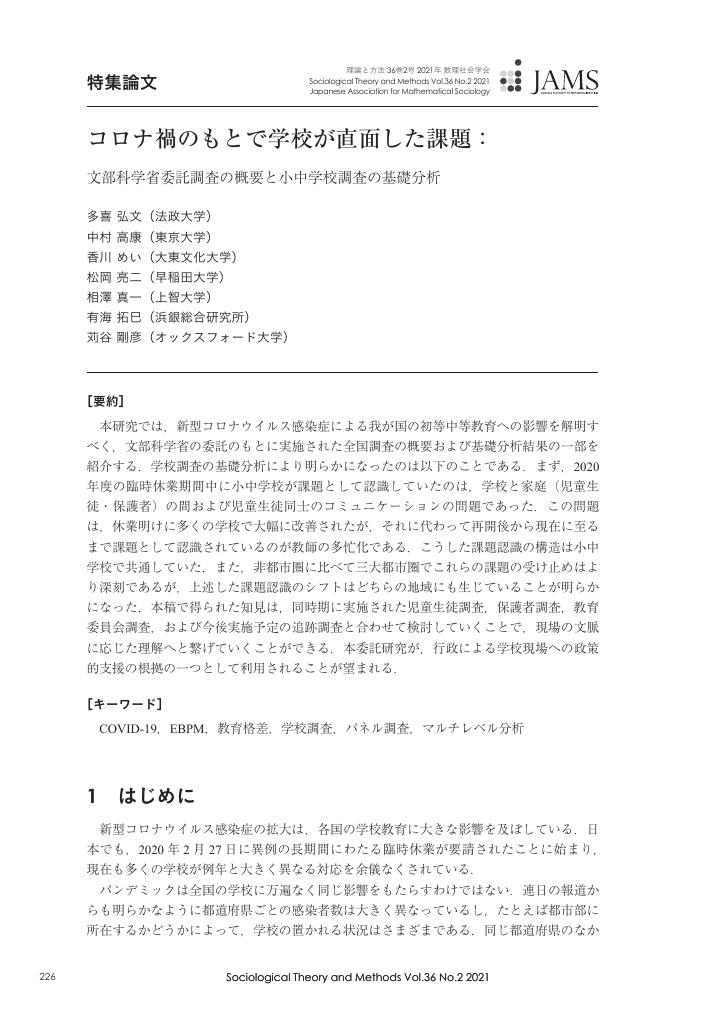34 0 0 0 OA 誰のための, 何のための研究評価か ─文系研究の日本的特徴
- 著者
- 苅谷 剛彦
- 出版者
- 公益財団法人 日本学術協力財団
- 雑誌
- 学術の動向 (ISSN:13423363)
- 巻号頁・発行日
- vol.23, no.10, pp.10_24-10_29, 2018-10-01 (Released:2019-02-15)
- 参考文献数
- 3
14 0 0 0 OA [生きる力]はいかに伝えられたか : 学習指導要領の定着過程に関する社会学的研究(学校(2))
12 0 0 0 OA コロナ禍のもとで学校が直面した課題: 文部科学省委託調査の概要と小中学校調査の基礎分析
7 0 0 0 OA 学習時間の研究 努力の不平等とメリトクラシー
- 著者
- 苅谷 剛彦
- 出版者
- 日本教育社会学会
- 雑誌
- 教育社会学研究 (ISSN:03873145)
- 巻号頁・発行日
- vol.66, pp.213-230, 2000-05-10 (Released:2011-03-18)
- 参考文献数
- 24
- 被引用文献数
- 6 6
In the field of the sociological study of educational attainment, inequality due to socioeconomic status has long been a major theme. Many theories have been proposed to explain such inequalities: heredity, cultural deprivation, linguistic socialization, anti-school culture, and cultural capital. Most of these theories, which emerged from the West, emphasize differences in ability or preschool-family socialization depending on SES (socioeconomic status). Based on empirical analyses of the study hours of Japanese high school students, this study attempts to challenge these Western theoretical traditions by introducing a theory of inequality of effort.This study uses two survey data sets of 11th graders in 11 Japanese high schools: one was collected in 1979, and the other in 1997, using questionnaires with the same questions. Using these two data sets, the after-school study hours of students are compared between the two periods, and the influences of socioeconomic status on study hours are also examined. Cross tabulation analysis, comparing means of study hours, and regression analyses are conducted. The results of these analyses show that study hours decreased over the 18 years, that the degree of decrease differed among different SES groups, and that the effect of SES has increased over the 18 years, after controlling other variables.Based on these findings, we argue that inequality of effort contributes to the inequality of educational attainment, that the effect of SES is dependent on educational situations, such as the reduction in the pressure of “exam hell” which has been caused by a decline of young people's population and education reform, and that even in Western societies, inequality of effort may be involved in inequalities of educational attainment. We contend that the ideology of meritocracy, particularly the Japanese version of it with its strong emphasis on effort, successfully conceals a reality of unequal educational attainment by assuming an equal distribution of efforts.
7 0 0 0 OA 学習時間の研究─努力の不平等とメリトクラシー─
- 著者
- 苅谷 剛彦
- 出版者
- 日本教育社会学会
- 雑誌
- 教育社会学研究 (ISSN:03873145)
- 巻号頁・発行日
- vol.66, pp.213-229, 2000-05-15
In the field of the sociological study of educational attainment, inequality due to socioeconomic status has long been a major theme. Many theories have been proposed to explain such inequalities : heredity, cultural deprivation, linguistic socialization, anti-school culture, and cultural capital. Most of these theories, which emerged from the West, emphasize differences in ability or preschool-family socialization depending on SES (socioeconomic status). Based on empirical analyses of the study hours of Japanese high school students, this study attempts to challenge these Western theoretical traditions by introducing a theory of inequality of effort. This study uses two survey data sets of 11th graders in 11 Japanese high schools : one was collected in 1979,and the other in 1997,using questionnaires with the same questions. Using these two data sets, the after-school study hours of students are compared between the two periods, and the influences of socioeconomic status on study hours are also examined. Cross tabulation analysis, comparing means of study hours, and regression analyses are conducted. The results of these analyses show that study hours decreased over the 18 years, that the degree of decrease differed among different SES groups, and that the effect of SES has increased over the 18 years, after controlling other variables. Based on these findings, we argue that inequality of effort contributes to the inequality of educational attainment, that the effect of SES is dependent on educational situations, such as the reduction in the pressure of "exam hell" which has been caused by a decline of young people's population and education reform, and that even in Western societies, inequality of effort may be involved in inequalities of educational attainment. We contend that the ideology of meritocracy, particularly the Japanese version of it with its strong emphasis on effort, successfully conceals a reality of unequal educational attainment by assuming an equal distribution of efforts.
4 0 0 0 OA 関西調査のダイジェスト(第2部 学力と学習行動の実態)
3 0 0 0 IR 地方公立進学校におけるエリート再生の研究
- 著者
- 苅谷 剛彦 安藤 理 有海 拓巳 井上 公人 高橋 渉 平木 耕平 漆山 綾香 中西 啓喜 日下田 岳史
- 出版者
- 東京大学大学院教育学研究科
- 雑誌
- 東京大学大学院教育学研究科紀要 (ISSN:13421050)
- 巻号頁・発行日
- vol.47, pp.51-86, 2007
For academic high school students in local areas, it is necessary to make geographical transition from their home town to cities to go to ""good"" universities, while others may decide to remain their home countries to go to local colleges. What factors differentiate students into those two routes to have higher education? For what sake do some students decide to leave for large cities, and others to stay in their home town? This study pays attention to geographical mobility of students in top rank academic high schools in Japan. We administered a survey of 3,767 senior students in 12 high schools, all of which admit academically top students in their areas in 2006 and 2007. By analyzing the survey data, we will explore the following research questions: 1. What factors, including structural and socio-psychological, influences students'decision of mobility both at college entrance and future job entry? 2. What reasons lead them to pursue ""elite"" universities? Which goals either for self -realization or contribution to the society give rationale to apply for those universities? Are there any different mechanisms of this determination between high schools in large cities and rural areas? 3. What factors influence the formation of students'consciousness to contribute to the society? Do school experiences raise such consciousness? What school activities and cultures affect it? The data analyses shows that academic high schools in local communities have power to influence students'mobility and creating consciousness for devoting for the society.
3 0 0 0 OA 「キャッチアップ終焉」後の教育改革に関する比較社会学的研究
この研究は、1970年代末から1980年代初頭にかけて、政府関係の審議会等の公式文書や政策文書において、日本が西欧諸国へのキャッチアップが完了したという認識を持つに至った経緯、さらにはその認識を持つことで、その後の教育政策やその基盤となる社会認識・教育問題の社会的構築にどのような影響がおよんだのかを明らかにした。研究の結果、ジャパン・アズ・ナンバーワンなどの海外の日本認識が提供した知識の影響と、キャッチアップ型近代化の限界と問題点が日本の教育政策を打ち立てる上でのトラウマとしてつきまとっていたことが示された。中央集権制や詰め込み受験教育の弊害などの「開発国家型」の教育としての問題である。
3 0 0 0 若者よ、丁稚奉公から始めよう
2 0 0 0 OA 社会学教科書の比較社会学
- 著者
- 苅谷 剛彦
- 出版者
- The Japan Sociological Society
- 雑誌
- 社会学評論 (ISSN:00215414)
- 巻号頁・発行日
- vol.56, no.3, pp.626-640, 2005-12-31 (Released:2009-10-19)
- 参考文献数
- 21
- 被引用文献数
- 5 1
大学教育の場を通じて, 社会学の知識は, どのように教えられるのか.この論文では, 日米で使われている社会学入門の教科書の比較分析を通じて, 日本とアメリカにおける教育的知識としての社会学知の生産・再生産様式の特徴について分析を加える.問題設定の1節に続き, 2節では, 教科書の分析を通して, 社会学知がどのように編集され, 提示されているのかを比較する.その上で, 3節では, アメリカの大学教育の特徴を, 日本と比較しながら検討する.社会学知が伝達される当の舞台である大学の教室が, 日米でどのように異なるのか.それが, 教科書における知識の社会的構成にどのような影響を与えているのかを検討するのである.そこでは, 日本の大学教育の特徴が, 社会学知の標準化の程度を弱めていることが明らかとなる.4節では, これらの分析をふまえて, 日本における社会学知の生産と再生産が抱える課題について考察を加える.そこでは, アメリカに比べ社会学知のノーマル・サイエンス化が進んでいない日本において, 社会学知の方法知 (社会学的なものの見方の伝達) へのシフトが起きていることの問題性について考察する.
2 0 0 0 OA 問題の設定(第3章 変化・授業タイプ・学習レリバンス)
- 著者
- 苅谷 剛彦
- 出版者
- 東京大学大学院教育学研究科付属学校臨床総合教育研究センター
- 雑誌
- 学校臨床研究
- 巻号頁・発行日
- vol.2, no.2, pp.43-44, 2003-03-24
2 0 0 0 OA 地方公立進学校におけるエリート再生の研究
- 著者
- 苅谷 剛彦 安藤 理 有海 拓巳 井上 公人 高橋 渉 平木 耕平 漆山 綾香 中西 啓喜 日下田 岳史
- 出版者
- 東京大学大学院教育学研究科
- 雑誌
- 東京大学大学院教育学研究科紀要 (ISSN:13421050)
- 巻号頁・発行日
- vol.47, pp.51-86, 2008-03-10
For academic high school students in local areas, it is necessary to make geographical transition from their home town to cities to go to "good" universities, while others may decide to remain their home countries to go to local colleges. What factors differentiate students into those two routes to have higher education? For what sake do some students decide to leave for large cities, and others to stay in their home town? This study pays attention to geographical mobility of students in top rank academic high schools in Japan. We administered a survey of 3,767 senior students in 12 high schools, all of which admit academically top students in their areas in 2006 and 2007. By analyzing the survey data, we will explore the following research questions: 1. What factors, including structural and socio-psychological, influences students'decision of mobility both at college entrance and future job entry? 2. What reasons lead them to pursue "elite" universities? Which goals either for self -realization or contribution to the society give rationale to apply for those universities? Are there any different mechanisms of this determination between high schools in large cities and rural areas? 3. What factors influence the formation of students'consciousness to contribute to the society? Do school experiences raise such consciousness? What school activities and cultures affect it? The data analyses shows that academic high schools in local communities have power to influence students'mobility and creating consciousness for devoting for the society.
2 0 0 0 OA 二つの学力観を越えた議論を(第1章 小中学生基礎「学力」はどう変ったか)
- 著者
- 苅谷 剛彦
- 出版者
- 東京大学大学院教育学研究科付属学校臨床総合教育研究センター
- 雑誌
- 学校臨床研究
- 巻号頁・発行日
- vol.2, no.2, pp.5-7, 2003-03-24
- 著者
- 苅谷 剛彦
- 出版者
- 社会政策学会
- 雑誌
- 社会政策学会誌 (ISSN:24331384)
- 巻号頁・発行日
- vol.17, pp.32-48, 2007-03-31 (Released:2018-04-01)
A number of advanced countries, including Japan, are conducting neo-liberal education reforms such as the decentralization and devolution of control over education, privatization, school choice, and national testing. In addition, economic globalization and the rise of the "knowledge-based" economy may make education an important arena of socio-economic policy as governments seek to enhance human capital and individuals' employability, and to provide equal opportunity in life chances. In this paper, I argue that those changes promote a shift of human capital formation toward the rise of "learning capitalism". In Japan, especially, this shift coincides with the transformation from the "Japanese Mode of Credential Society" to the "Learning Capitalist Society", where learning skills and competences become core mechanisms to form, accumulate, and arrange human capital. Previously, under the Japanese mode of credential society, career paths were seen as simple and straightforward. Success in entrance examinations was thought to be the main route to enter good schools and universities, then to get into good workplaces and lead happy lives. Being good at memorizing school knowledge was seen a key factor for this success story. Upon getting into good jobs, which usually meant working for large companies, employees from prestigious universities were given more opportunities to pursue advancement. Their learning skills, sometimes called "trainability", might have played an important role behind the scenes, but their importance was not clearly recognized. The Japanese mode of credential society changed and declined during the 1990s. This transformation was caused by changes in labor markets and in education. Acquiring learning skills and competences took the place of memorizing knowledge. Now both in the workplace and in school, people are expected to master advanced learning skills and competences to keep up with rapid changes in technology and society. People are also required to pursue lifelong learning. In addition, they are expected to become 'clever' investors in choosing what, how, and when they should learn in order to maximize their human capital. In other words, learning skills and competences have become "capital" in this society. However, the distribution of learning skills and competences among students is not equal. In the paper, using survey results, I show that they are unequally distributed among children from different family backgrounds. I then argue that the recent decentralization of education funding and neo-liberal education reforms such as the introduction of voucher systems will increase inequality in learning capital accumulation.
1 0 0 0 アメリカの大学・ニッポンの大学 : TA、シラバス、授業評価
1 0 0 0 OA 地方公立進学高校における「プラスアルファ」の教育と進路形成
本研究は、公立-私立、大都市-地方という教育における分化の進行を背景に、地方の公立高校のはたす役割はどのようなものかを、ユニークな教育実践に取り組む公立進学校に焦点を当て、実証的に明らかにすることを目的に行われた。地方の公立進学高校は、大都市部の私立中高一貫校と同じ土俵にのって、大学進学競争を強化しようとしているだけなのか。地方のための/地方からの人材形成という機能を、どのようにとらえ、どのように実践しようとしているのか。そして、その成果は、生徒たちの実際の進路形成や価値意識の形成として、どのように現れているのか。本研究では、たんに大学進学の実績を上げることに汲々としている進学高校ではなく、教育改革のねらいにも符合する「プラスアルファ」の教育をも合わせて実践している地方公立高校を中心に取り上げ、総合的な調査研究を行うことによって、これらの問題を明らかにした。研究方法としては、特色のある教育を実践している地方の公立普通科高校を含む、11 校の高校に対する質問紙調査と、12校の高校を対象とした質問紙調査による。質問紙調査においては、同一対象者に対し、継続的な調査を行うパネル調査という方法を用いた。この方法を用いることで、高校時代の教育経験が、卒業後にどのような影響を及ぼしているのかを追跡することが可能になるからである。パネル調査として、高校3年次を対象とした生徒を、さらに卒業後1年目、2年目と二度にわたり追跡した。こうしたパネル調査を用いることで、プラスアルファの教育の効果を、時間をおいてとらえようとしたのである。これらの調査の結果、以下の知見が得られた。(1)地方から大都市の難関大学に進学することにより、地域間再分配政策に賛成しやすくなるというかたちで社会的責任が形成されること、(2)高校時代に学校行事に熱心に参加していた生徒ほど大学で自ら学んだり、成果を発表したりできていること、そして、(3)学校行事には出身階層下位の生徒が参加しやすいことを考慮すると、高校時代の学校行事には、階層下位の生徒が大学で学習しやすい環境を整えるという意味で階層間格差縮小の機能があるということである。これらの知見により、生徒たちの意識の差異を確認することで、高校段階における「プラスアルファ」の教育がその後のキャリア・社会生活(今年度は大学生活)に及ぼす影響を把握できたことになる。
1 0 0 0 OA 日本のメリトクラシーはどこまで日本的か ?
- 著者
- 苅谷 剛彦
- 出版者
- 日本社会学会
- 雑誌
- 社会学評論 (ISSN:00215414)
- 巻号頁・発行日
- vol.47, no.4, pp.491-497, 1997-03-30 (Released:2009-10-13)
- 参考文献数
- 4







